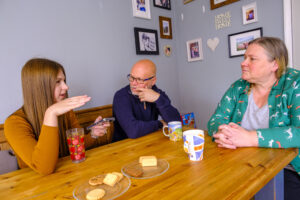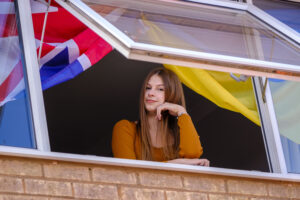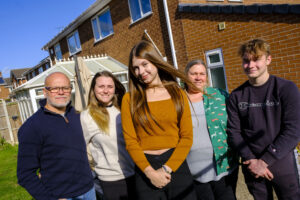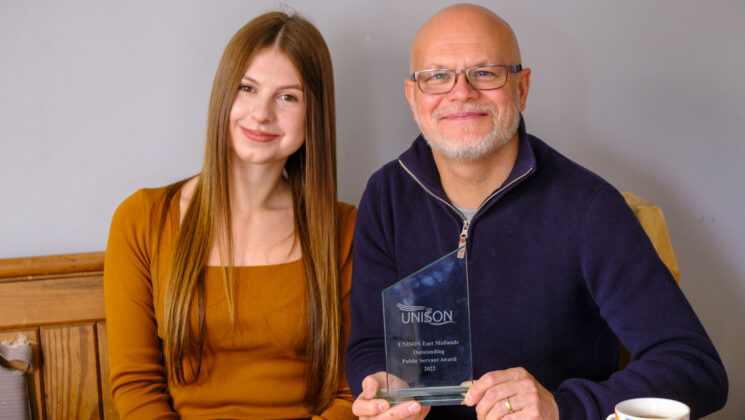The queue of traffic and people snaked ahead of them into the distance. They were still five kilometres from the Polish border, but Vlada knew that she had to say goodbye to her parents now, and make the rest of the journey alone on foot.
Vladyslava Bahinska was only 17 when she made that journey, overnight, in sub-zero temperatures, walking away from her family, away from her home in Ukraine, but also away from a devastating war. She was just one among thousands making the same journey in what was one of the largest movements of refugees since the Second World War.
Many of them moved toward the Polish border not knowing what they would find on the other side. Vlada, at least, knew there was someone waiting there for her. That was Rob Ferrol.
Chernobyl Children’s Lifeline
Rob (above, with Vlada) is a paramedic and a UNISON member from Worksop, in the East Midlands. Worksop seems a far cry away from Ukraine, but Rob and his family had links with the country long before the Russian invasion.
He and his wife, Sam, have worked with Chernobyl Children’s Lifeline for almost a decade. The charity was formed a few years after the Chernobyl nuclear disaster in 1986. As Rob explains: “What they found was that, with the background radiation, there was a high incidence of health problems amongst the children in the area. Birth defects were high, with high incidence of thyroid cancers because they were living and eating in a contaminated area.
“The charity was formed to bring these children away from that environment, just for a few weeks a year, and give them fresh fruit and veg to eat, because everything they ate was grown from ground that was contaminated. They estimated that the respite from contamination gave their immune system such a boost that it could improve their life expectancy by a few years.
“So, it’s a few weeks of the summer holidays where the charity organises lots of activity days out and things for the children to do whilst they’re here. It also gave our children the opportunity to get involved and interact with children from another country. For us it was a win, win situation.” In fact, Sam is now chairperson of the local link of the charity.
The Ferrols have hosted eight children over the years, between eight and 16 years of age. “They arrive all timid, don’t speak very much English and over the course of four weeks sort of merge into being a family member,” says Rob.
“It’s how they interact with your own children – you see their confidence growing and they thrive so much in that four-week period. It’s nice to see them going back to Ukraine stockier, brighter, and more lively.”
Vlada was the second child they hosted, 12 years old when she first came in 2016. Later on, both Rob and Sam visited Ukraine and met some of the families they had helped, including Vlada’s, as well as visiting the Chernobyl site.
It was after one of these visits, when they realised how difficult people’s lives were there, that the couple decided to pay, themselves, for Vlada to visit them a second time.

Vlada with Rob and Sam Ferrol
The war
On 24 February 2022, Russia invaded Ukraine.
When the war started, the Ferrols were in contact with many of the families they had come to know through the charity, offering support and starting to explore how it would be possible for them to help.
The Bahinskas lived in Irpin, a suburb of Kyiv, a place which made headlines early in the war with reports of Russian atrocities. When Rob was on the phone with them, he could hear bombs falling in the background – and, sometimes, the line would go dead.
And then, they lost communication for a number of days. “We didn’t know what happened. It was such a stressful time,” he recalls. Eventually he found out that the family had fled their home, to stay with a relative to the south of the city.
Vlada is an only child. Her father, because of his age, was obliged to stay in the country; her mother, a nursing assistant in a maternity hospital, also felt compelled to stay. “So Vlada was stuck there. She wanted to get away, but her parents couldn’t face the prospect of sending her on her own, which is understandable. So, they were in this Catch-22. What do they do?
“One Friday evening, it was 10 o’clock at night, we’re talking to Vlada, bombs are still falling, and I said, ‘Look if you can get yourself to the Polish border, I will make sure that I’m there to meet you, and we’ll get you to the UK somehow. That’s where it all went into a whirlwind, that evening. I was talking to Vlada, she spoke to her parents, and they took the decision there and then that the next morning they would drive her to the Polish border.”
Rob and Sam had their own, momentous decision to make. “That evening I booked a flight,” he says, “and I was on it at 6am the next morning.”
The wait
Rob flew to Krakow on Saturday 5 March, rented a car and arrived at the Polish side of the border that day. The Polish authorities had set up an industrial scale processing and refugee terminal in a giant warehouse about a mile from the border.
But their own journey took Vlada and her family two days, because of the war-time curfew. So Rob had to hunker down. And wait.
“The two days I had at the border are hard to describe. It was very surreal. I’d like to say it was chaotic, but it was organised chaos. Half of the building was partitioned off and was just a sea of beds and blankets on the floor, where people were bedding down. There was something like a jumble sale of clothing and foodstuffs. And in the second part there were different desks where you got information on where to find housing and transport links to get wherever you want to go on your onward journey.”
Rob reflects on the scale of what he saw. “It’s emotional to think I’ve borne witness to something that they’re equating to the biggest movement of refugees [in Europe] since World War Two. I can feel myself welling up just thinking about it again.
“There were lots of different nationalities, both helping and coming through the border – it wasn’t just Ukrainians. It was so heartwarming to see people giving up their time to help, it was unbelievable.”
As a paramedic, Rob wanted to get involved and help himself, “but obviously I don’t speak Polish or Ukrainian, and I thought I’d probably hinder things more than help. And it did give me the chance to scout the area and give Vlada as much information as I could, to get her through it all quickly.”
The meeting
Rob arrived on the Saturday but it was early on the Monday morning, around 2am, when Vlada finally made it through the border. He had been sleeping in a car for those two nights, in temperatures reaching well below zero.
“Don’t write this, it’ll make me look like a fool!” he jokes, “but it was an impulsive move to book a flight and fly straight out, so I went with just a small rucksack. I wasn’t prepared and didn’t realise how cold it was in early March in Poland.”
He was much more focussed on being in the right place to meet Vlada when she crossed over. Rob had told her to keep her phone fully charged and only switch it on when she had got through the border, because they didn’t know how long that would take.
At the same time, he had been sending Vlada photos of various landmarks at the refugee terminal, explaining how she should get to their meeting point – a huge digital information board outside the warehouse. And early on that Monday morning, after hours without contact, she sent a message to say she was at the information board.
“I couldn’t see her, so I thought: ‘You’re not, because I’m here!’ So, I took a photograph of this board and sent it to Vlada to prove that I was there. As soon as I sent it, I turned around, and there she was! Ironically, she’s actually in the photograph I took. It was dark, she was dressed in black, I had missed her in the sea of people.
“It was emotional, it really was. It’s hard to put into words. It was a huge relief that she’d made it through. You hear the distressing stories of people queuing on the other side with minimal amenities, not enough food and fluid and things. And it was so cold, minus eight or nine. You dread to think how people were coping.”
Vlada recalls the moment she finally saw Rob: “Everything was chaotic. So, seeing Rob, I felt I was safer. I felt relief at seeing a familiar face.”

The journey back
In a movie, perhaps, the story would have finished there, when Vlada and Rob met, but real life is rarely as simple as it is on screen. In real life there’s paperwork. A lot of paperwork. The goal was to get Vlada back to the UK, but at the time there was no scheme in Britain to aid refugees seeking asylum from Ukraine. So Vlada and Rob made their way to Warsaw, to “knock on embassy doors” and find out what their options were.
“It was frustrating. We knew we couldn’t get to the UK straight away, because of visa restrictions on Ukrainians, but Vlada had two previous visits for which she had valid visas. We thought, can we use those as a means of trying to speed up the process? But we didn’t get anywhere with the British authorities.”
They researched various asylum opportunities across Europe and decided that they needed to get Vlada as close as possible to the UK, before deciding on Ireland, which was already taking in refugees.
Vlada knew a family who had fled from Ukraine to Hungary. She and Rob waited two days for this family to join them in Poland, before they all flew to Ireland. This meant that if Vlada had to stay in Ireland for any length of time while UK visas were organised, she would not be alone.
Rob says he was “hugely impressed with the process in Dublin,” with food, drink and clothing provided, along with transport to their accommodation. “It was such a swift process, it was amazing.” Rob slept that night on the floor of Dublin Airport while waiting for a flight home the next day. By the time he arrived at his house, he had been away over nine days, much longer than he’d expected.
Thinking about the trip now, he says: “It was a big leap of faith, but I had to act on impulse, you know? You’ve got somebody you regard as a family member who’s being bombed, and you just have to do something to get them to safety and help their family out.”
Sam adds: “We had been following the news avidly, worrying about all the children we have hosted, and their families too. When we saw that Irpin was being heavily targeted, we offered to help Vlada and her family. From the moment Rob flew out I spent all my time trying to sort accommodation, visas, flights, communicating with government departments, friends and looking at different countries’ requirements of entry, so that Rob could travel safely with Vlada.
“I felt so nervous for Vlada’s family having to make the journey across Ukraine to the border, and for Rob too, as he was entering the unknown.”

Vlada with the Ferrol family: Rob, Jodie, Sam and Andrew
The East Midlands
It took just over a month for Vlada to get from Ireland to the UK, eventually applying to the Homes for Ukraine scheme that the government launched in the middle of March. Since then, she has gone through the full UK visa process and been given permission to stay for up to three years.
Rob says: “She’s settled, and if she needs to stay here for three years, she’s more than welcome. She might want to go home and go back to her life, but I think she’d like to make the most of the opportunity she’s got while she’s here.”
This includes continuing her education. Vlada had been studying computer science via online lessons, but has recently been accepted to study the subject at university.
Speaking about settling into the country, she says: “I am really thankful to this lovely and kind family. I like the UK very much. People are really kind. Almost everyone is ready to host strangers as they have really big hearts. British people make me feel that I’m not alone and they are ready to help.”
There has been other news. Since Vlada made it to the UK, her mother and niece have also fled Ukraine to Ireland where, without travel documents, they are likely to remain. A few weeks before, Vlada’s father was conscripted into his country’s military.
In Worksop, a small Ukrainian community has established itself, with regular meetings and get togethers, including a larger gathering to mark the Ukrainian Independence Day.
And for his efforts, Rob received the East Midlands Public Servant of the Year Award at his local UNISON branch.
How to donate to the Ukrainian trade union movement
Donations should be sent to ITUC-CSI
Account number 068-9007804-23 with Belfius Banque SA, Boulevard Pachéco 44, B – 1000 Brussels,
(BIC/Swift code: GKCCBEBB – IBAN Code: BE92 0689 0078 0423).
Any amount will be appreciated.Please mark the contribution for ‘Ukraine’ and, if not possible, please alert finance@ituc-csi.org to what has been sent and say it is for Ukraine.
Words: Simon Jackson
Images: Jess Hurd

